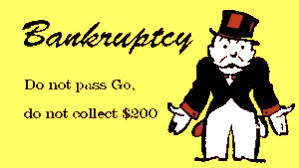 Suppose you are trying to refinance your client's balloon payment on his office building, but you run out of time. At the advice of his attorney, he files a Chapter 11 Bankruptcy. The moment he does this, the foreclosing lender becomes subject to an automatic stay. In other words, the foreclosing lender must immediately freeze in his tracks. "Sit, Oboo. Stay!" He can't call and harangue the borrower, nor can he continue his foreclosure until a bankruptcy judge grants his Motion for Relief From the Automatic Stay. (C'mon, Judge, let me finish off this foreclosure.)
Suppose you are trying to refinance your client's balloon payment on his office building, but you run out of time. At the advice of his attorney, he files a Chapter 11 Bankruptcy. The moment he does this, the foreclosing lender becomes subject to an automatic stay. In other words, the foreclosing lender must immediately freeze in his tracks. "Sit, Oboo. Stay!" He can't call and harangue the borrower, nor can he continue his foreclosure until a bankruptcy judge grants his Motion for Relief From the Automatic Stay. (C'mon, Judge, let me finish off this foreclosure.)
If this was a Chapter 7 Bankruptcy - a complete liquidation of the debtor's assets in order to (partially) repay his creditors - a bankruptcy trustee would be appointed to marshal the debtor's assets. Liquidation is just a fancy legal term that means "sell the asset and convert it into cash". A bankruptcy trustee is typically an attorney paid by the court out of the assets of the debtor's estate (and who almost never returns phone calls). To marshal the assets means "to gather up the stuff that the debtor owns", like a French general assembling his troops before he attacks.

Sometimes it is not necessary to sell off everything that the debtor owns in order to satisfy his creditors. Sometimes the debtor just needs some time to reorganize his assets; i.e, to sell off some assets (maybe a rental house or a valuable stamp collection) or to refinance some buildings. In such a case, your borrower will merely file a Chapter 11 Reorganization Bankruptcy
Even though a bankruptcy trustee will still be appointed in a Chapter 11 case to be the eyes and ears of the court, title to all of debtor's assets still remains in the name of the debtor. This is in stark contrast to a Chapter 7 Bankruptcy. In a Chapter 7 case, the instant the debtor files his bankruptcy, his assets immediately become the property of the bankruptcy estate. This is why the debtor in a Chapter 11 Bankruptcy case is often called a debtor-in-possession. He still technically owns his stuff.

In our imaginary example, your client is now in bankruptcy. He needs to find a commercial lender who will refinance his balloon payment while he is in bankruptcy, thereby allowing him to dismiss his Chapter 11. Unfortunately very few commercial banks (practically none) will finance a debtor who is in bankruptcy, even if the cause is merely being late to pay off a balloon payment.
The debtor needs to find a bridge lender to refinance his balloon payment. Once the ballooning loan is paid off and the Chapter 11 Bankruptcy has been dismissed, then the debtor can go back to an understanding bank and refinance the more expensive bridge loan with a cheaper bank loan. Blackburne & Sons (my own firm) is an example of a private money lender that will make commercial real estate loans to debtors in bankruptcy.
Okay, so you find the debtor a commercial lender willing to make him a quick loan to pay off his ballooning commercial loan, even though your debtor is still in bankruptcy. You can now simply trot your commercial borrower down to the title company and have him sign off, right?
No! If a borrower is in bankruptcy, the new lender needs the bankruptcy court's permission to make the debtor a new loan. "But the bankruptcy trustee said it was okay!" The bankruptcy trustee's permission is not enough. Lots of small hard money shops make this mistake. They get the bankruptcy trustee's permission to refinance but not the court's permission. No commercial mortgage loan signed by the debtor in bankruptcy is enforceable unless the bankuptcy judge has signed an order granting the debtor permission to sign the loan documents. The debtor's bankruptcy attorney will handle this order in a motion format that includes the term sheet of the commercial lender (Blackburne & Sons).
Earlier I used the term debtor-in-possession. This is the debtor in Chapter 11 who retained title to his stuff. There is a special kind of bankruptcy financing called debtor-in-possession financing (DIP Financing). This refinance of a past-due balloon payment by Blackburne & Sons is technically NOT debtor-in-possession financing. Why? Because when we close our refinance, the debtor is no longer in bankruptcy. We've paid off the balloon payment, so the debtor has no reason to remain in bankruptcy. The bankruptcy is dismissed.
Anybody out there know the difference between a bankruptcy discharge and a bankruptcy dismissal? When you dismiss a bankruptcy, you're saying that the time-out is over. The automatic stay of your creditors is instantly lifted. Oboo no longer has to keep sitting.
In contrast, debts are discharged in a Chapter 7 Bankruptcy. They are wiped out. The debtor no longer owes those debts.
Okay, now let's finish up with debtor-in-possession financing. (Blackburne & Sons makes these commercial loans too!). DIP Financing is when the debtor stays in the Chapter 11 Bankruptcy, and some existing lenders are forced to subordinate to a fresh injection of cash.
Example: The Blackburne Bakery has been in business for 50 years. We make good money. Sadly one of our bakers chops off a finger, and the finger ends up in the pie of Nervous Nellie. Nellie bites down, swallows half the finger, and then faints. Even though it was healthy protein, the jury awards Nellie the Swooner a whopping $750,000. In the meantime, our reputation is temporarilly damaged, and sales plummet. (My goodness, it was just a finger!)
Unable to make payroll, the company president puts the bakery into a Chapter 11. The good news is that our specialized pie factory is huge, and we only owe $500,000 against it. The bakery needs $750,000 to pay Nellie, $250,000 for payroll, and another $300,000 to carry the bakery until all of our loyal customers forget that our baked goods come with surprises inside.
If a lender made the bakery a $1.3 million new first mortgage on the factory, and the existing first mortgage holder was ordered by the bankruptcy court to subordinate, this would be an example of debtor-in-possession financing.
Here's a great deal for you:
Are you registered on C-Loans yet? Here's the reality. You are far more likely to enter a new commercial loan into C-Loans.com if you have already registered on the site (filled in your name and address). In order to bribe you to finally register on the site, I will send you a free copy of our $199 Commercial Mortgage Underwriting Manual if you register.
Keep looking for the business card of a bankers making commercial real estate loans. We'll trade you the contents of just one business card for a free directory of 2,000 commercial real estate lenders. We solicit these bankers to refer their turndowns to C-Loans. Or you can buy this same directory here for $39.95.
In the 300-year history of commercial real estate finance (CREF), there has never been a better time to be a commercial mortgage broker. More commercial loans are ballooning in 2016 than in any year in history.
Everybody loves atta-boys. If I've taught you a little today, how about a Facebook share, a Google Plus one, a re-Tweet, or a Linked-In share? Thanks so much! :-)




















